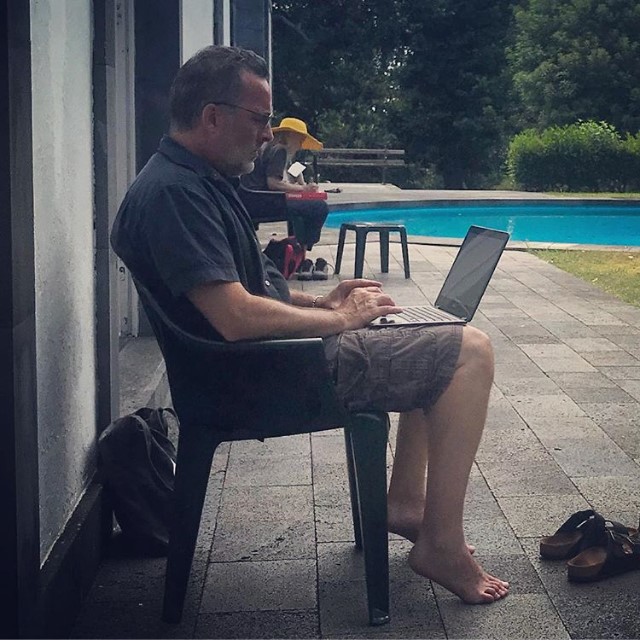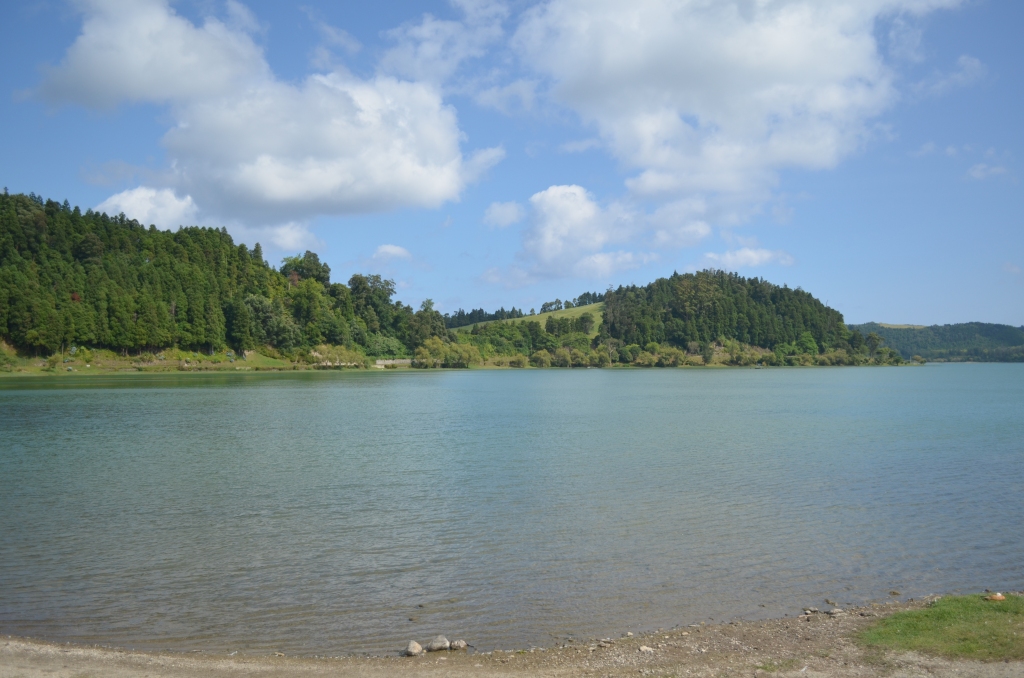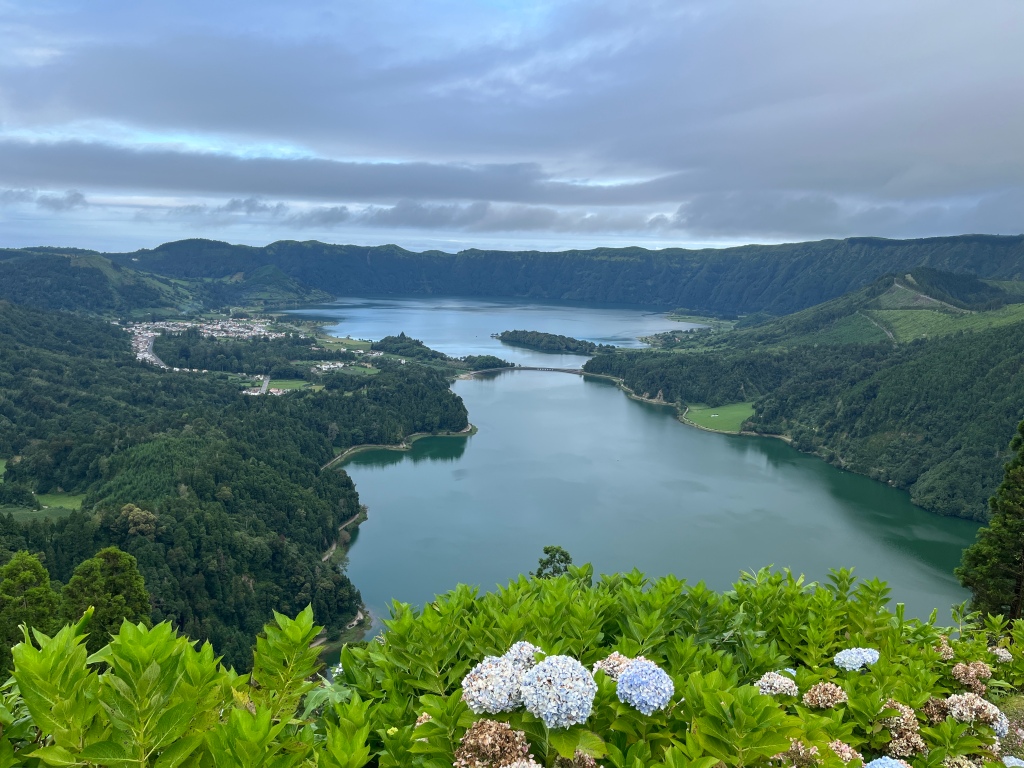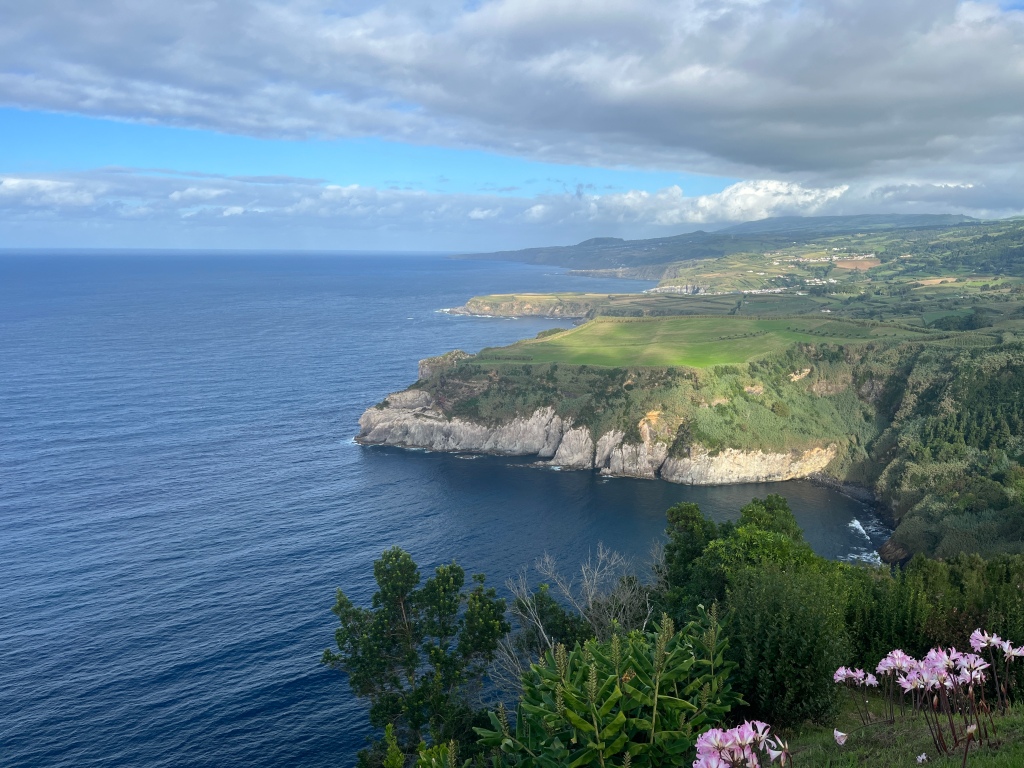My Year in Writing 2023
December 6, 2023
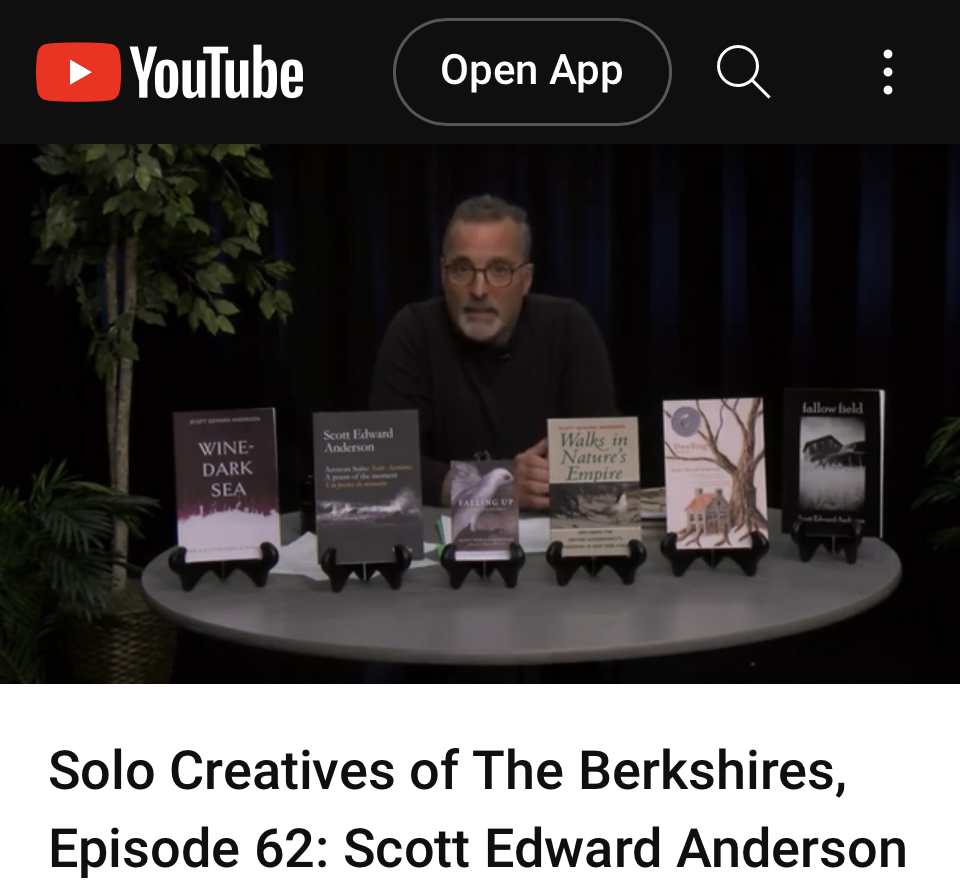
Now is the time, between my birthday and the end of the year, when I take stock of my year in writing. This year, which culminated my sixtieth trip around the Sun, has been a pretty productive year.
Here are some of the highlights:
Barzakh Magazine accepts essay, “Açorianidade & the Radiance of Sensibility” just after Xmas! (Published in January)
Reading of Berkshire Writers in Housatonic; read the first chapter of Falling Up. (January)
Guest writer @ Margarida Vale de Gato’s Eco-poetics Masters Class, Universidade de Lisboa via Zoom (January)
Alfred Lewis Bilingual Reading Series, FresnoState PBBI(part of the PBBI-FLAD lecture series 2023), Co-curators: Diniz Borges and RoseAngelina Baptista; Poets: Alberto Pereira, Sam Pereira, PaulA Neves, Scott Edward Anderson, and RoseAngelina Baptista (February)
Guest lecturer, Universidade de Lisboa, Professora Margarida Vale de Gatos’ class on American Literature in person. (March)
Guest speaker, Universidade dos Açores, Ponta Delgada, Professora Ana Cristina Gil’s class, in person. (March)
My essay, “STUDIO LOG: THE TOM TOM CLUB’S “GENIUS OF LOVE,” A MEMOIR AND EXPOSITION IN 18 TRACKS,” lost in the 2nd Round of the Marchxness battle of “One Hit Wonders” to Adam O. Davis’ essay on “In a Big Country” by Big Country. (March)
Installation of my poem. “River of Stars,” on Poetry Path at Ryan Observatory at Muddy Run, and presentation with Michele Beyer (a teacher inspired by my conversation with Derek Pitts in November 2022) to write poetry with her class. (April)
Interview by Francisco Cota Fagundes published in Gávea-Brown: A Bilingual Journal of Portuguese-American Letters and Studies, XLVII, as part of a special issue devoted to Celebrating Portuguese Diaspora Literature in North America. (Spring)
Guest lecturer, University of California at Santa Barbara, Portuguese literature class, Professor André Corrêa de Sá. (June)
“Love & Patience on Mt. Pico” (essay) published in The Write Launch (July)
“Through the Gates of My Ancestral Island” (essay) published in Panorama: The Journal of Travel, Place, and Nature (July)
“Orpheu Ascending,” a review of Orpheu Literary Quarterly, volumes 1 and 2, translated from the Portuguese by David Swartz, published in Pessoa Plural—A Journal of Fernando Pessoa Studies, Issue 23 (July)
Seeing—Reading—Writing: Transforming Our Relationship to Language and Nature: A Workshop with Ryan Shea and Scott Edward Anderson at The Nature Institute, Ghent, NY (July)
Creative nonfiction mentor, Adroit Journal Summer Mentorship Program, mentored two students. (July)
“Birds in the Hand: The Berkshire Bird Observatory’s Impassioned Ben Nickley” (article) in Berkshire Magazine. (July)
Poetry booth, “Zucchrostic poems,” at West Stockbridge, MA, Zucchini Festival (August)
Two poems in Into the Azorean Sea: A Bilingual Anthology of Azorean Poetry, translated and organized by Diniz Borges, published by Letras Lavadas in São Miguel and Bruma Publications, Fresno State. (August)
Meet & Greet at The Book Loft in Great Barrington, MA. (Sept)
“Berkshire Brain Gain” (article) published in Berkshire Magazine (Sept)
Dedication of Binocular telescope at Ryan Observatory at Muddy Run and poems by Ada Limón and Gabe Catherman installed on Poetry Path. (October)
Visited Praia da Vitória on Terceira Island, Azores, birthplace and boyhood home of Vitorino Nemésio. (October)
Participated in Arquipélago de Escritores in Angra on Terceira Island. (October)
Met António Manuel Melo Sousa in Ponta Delgada with Pedro Almeida Maia (see related entry below) (October)
Guest lecturer, Fresno State, Professor Diniz Borges’ class on Azorean Literature, presented “Becoming Azorean American: A Diasporic Journey,” (lecture). (October)
“António Melo Sousa, Letras de canções e outros rascunhos – uma apreciação” (review) published in Grotta: Arquipélago de Escritores, #6. (November)
Recorded an episode of “Solo Creatives of the Berkshires” for CTSB-TV, Community Television for the Southern Berkshires, presenting and reading from several of my books. (November)
“Get ‘Hygge’ With It: Cozy Spots and Comfort Food in the Berkshires” (article) published in Berkshire Magazine. (December)
“Seeking My Roots Through a Painter’s Eyes” (essay) published in Revista Islenha, Issue 73, in Madeira, Portugal. (December)
Habitar: um ecopoema, Margarida Vale de Gato’s translation of my book, Dwelling: an ecopoem, gets mention in Paula Perfeito’s Entre-Vistas blog. (27 December)
What a year! I am exceedingly grateful to everyone who has supported my writing over the past year. As Walter Lowenfels wrote, “One reader is a miracle; two, a mass movement.”
Like I said last year, I feel like I’ve been blessed by a mass miracle this year!
Discover the Power of Deep Attention: Seven Reasons to Join the Azores Writing Retreat with Scott Edward Anderson
July 7, 2023
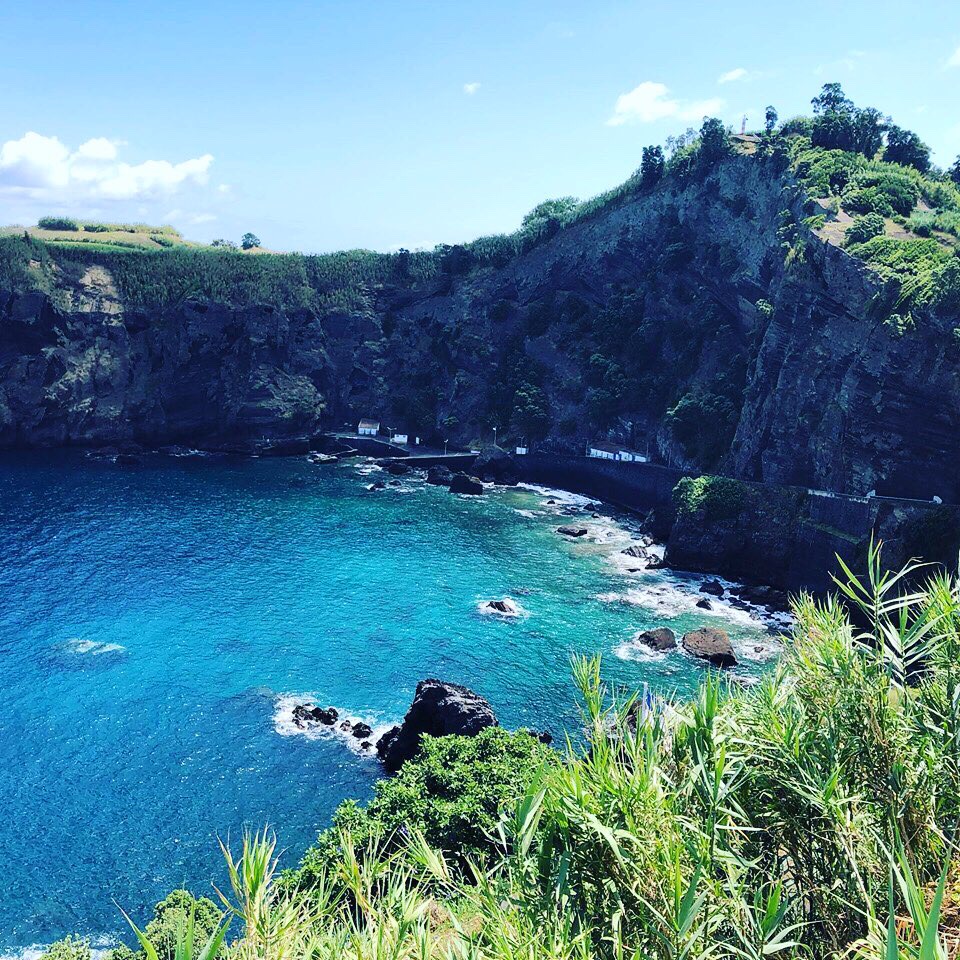
Are you a writer seeking to delve into the depths of your creative well? Are you a would-be writer who has always wanted to write, but could never find the time or discipline? Do you long to cultivate a focused, immersive writing practice that transcends distractions and unlocks your true potential?
If so, we invite you to embark on a life-changing journey to the breathtaking Azores archipelago for a Deep Attention Writing Retreat with the esteemed author Scott Edward Anderson. From 13-18 October 2023, get ready to immerse yourself in an oasis of inspiration, surrounded by stunning natural beauty and the nurturing guidance of an expert wordsmith.
Here are seven reasons why attending this retreat could be the turning point in your writing journey:
1. Unleash Your Creative Potential: Scott Edward Anderson, an award-winning poet, memoirist, and essayist, is renowned for his ability to coax out the hidden depths of creativity within writers and would-be writers alike. Through his extensive experience and compassionate mentorship, he will help you tap into your unique voice and express your ideas with profound clarity and emotional resonance.
2. Deep Attention Practice: In an age of constant distractions, cultivating deep attention has become a superpower. This retreat is designed to help you reclaim your focus and immerse yourself in the present moment, where creativity flourishes. Through mindfulness exercises and specially curated nature-based interactive sessions, you will learn how to quiet the noise of the world and give undivided attention to your craft.
3. Inspiring Natural Surroundings: Nestled in the stunning Azores archipelago, this retreat on São Miguel Island offers an idyllic setting for creative exploration. Picture yourself surrounded by lush green landscapes, breathtaking ocean views, and the soothing sounds of nature. The serene ambiance of the Azores will inspire and invigorate your writing, providing the perfect backdrop for introspection and inspiration.
4. Intimate and Supportive Community: Connecting with fellow travelers who share your passion can be a transformative experience. The retreat fosters a warm and nurturing community, allowing you to engage in meaningful discussions, exchange ideas, and form lasting connections. The power of collective creativity and support will propel you forward on your writing journey long after the retreat ends.
5. Expert Guidance and Mentorship: Scott Edward Anderson’s wealth of knowledge and expertise will guide you through the intricacies of his Deep Attention writing practice. He will share invaluable insights into the craft and practice of writing and evoking deep emotions through language. His mentorship will help you grow as a writer and expand your creative boundaries, as it has for others like M. Chun, who says that Anderson “continuously expressed an encouraging and supportive approach toward my creative work, and I easily felt comfortable and confident sharing my ideas with him…[he] kindled my brainstorming process by recommending similar pieces and writers, and he also helped me pinpoint themes…from my initially unstructured ideas.”.
6. Reflection and Self-Discovery: Writing is not just about words on a page; it is a profound act of self-discovery. During the retreat, you will have ample time for introspection, allowing you to explore your inner landscape, uncover new perspectives, and deepen your understanding of yourself and your craft. This transformative journey will leave you with a newfound sense of purpose and direction in your writing.
7. Cultural Immersion: The Azores, with its rich cultural heritage and vibrant traditions, offers a unique opportunity for cultural immersion. From exploring local cuisine to engaging with the island’s history and culture, you’ll gain fresh insights that can enrich your writing. The vibrant tapestry of Azorean life will infuse your work with a sense of place and authenticity.
Spaces for this exclusive retreat are limited, so seize the opportunity to embark on a transformative journey of creative exploration. Escape the distractions of daily life, immerse yourself in the Azores’ natural beauty, and let Scott Edward Anderson’s guidance and mentorship unlock the full potential of your writing. Join us on this profound adventure and discover the transformative power of Deep Attention. Register today: Azores Deep Attention Writing Retreat
My short answer to this question is “No, absolutely not.” In fact, I’ve specifically designed the Azores Writing Retreat to meet you where you are as a participant, whether you consider yourself a writer or not. We all have stories we need to tell. Whether we consider ourselves writers is beside the point.
“We tell ourselves stories in order to live,” Joan Didion began her famous essay “The White Album.” I would further argue that we tell stories because it is an essential act of being human. Indeed, some scientists believe we may be hard-wired to tell stories.
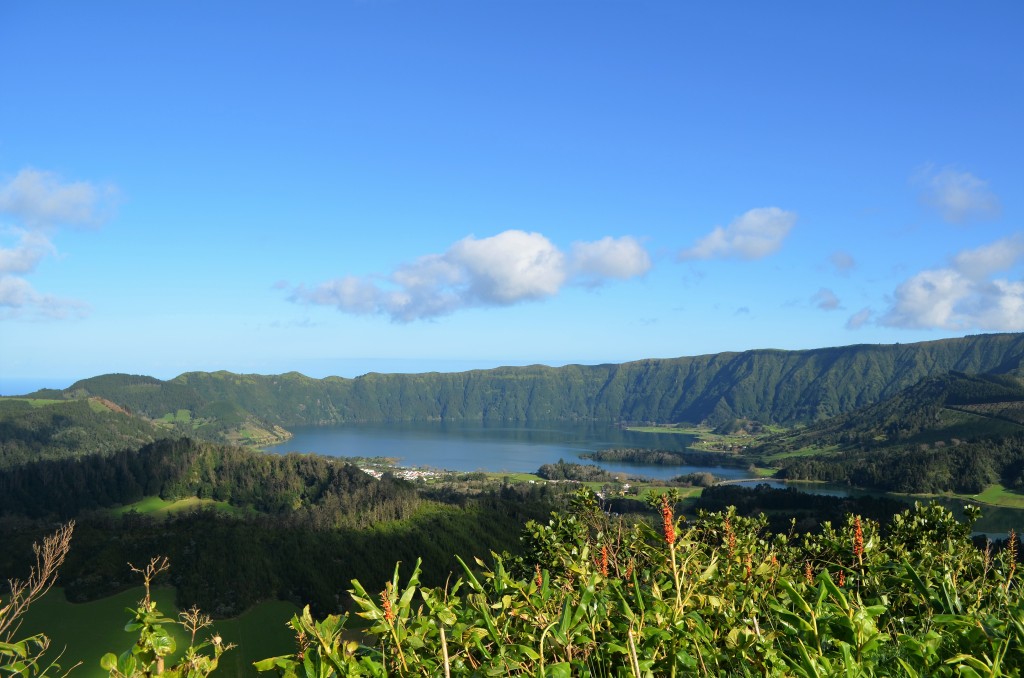
As I wrote in my essay, “Telling Stories to Change the World,” which appeared in Terrain.org in 2006, “a story is a narrative account of a real or imagined event or events. Stories build worlds and define worldviews. Sharing experience through stories, we pass on accumulated wisdom, beliefs, and values. Through stories we explain how and why things are, and we define our role and purpose.”
In that essay, I also quote the National Storytelling Network, which says that “Stories are the building blocks of knowledge, the foundation of memory and learning.” They “connect us with our humanness and link past, present, and future.”
From our earliest time as a species, when we were hunter-gatherers, we told stories about the best hunting places or where plentiful berries could be found. Later, we told each other stories about planting crops and which crops grew best in what climate, soil, or aspect of the sun. We evolved as a species through stories, and we are grounded in stories. Storytelling may be a tradition as old as human communication itself.
Stories connect people to other people and to place, to the land and sea. That’s what I’m trying to do with the Azores Writing Retreat. We’ll spend five days getting connected to the land and sea of my ancestral island, São Miguel. We’ll connect with the nature, culture, food, and people of the island. And we’ll connect with each other as a cohort, listening to the stories we have within us that are yearning to be told.
At the end of the Azores Writing Retreat, whether you consider yourself a writer or not, my hope is you will come away with a deeper appreciation of the stories you have to write and a sense that your stories are important, whether you write them for yourself, your friends and family, or for possible publication. I hope you’ll join me on this remarkable journey.
For more information and to Register for the retreat: Azores Writing Retreat
Why a Writing Retreat in the Azores?
May 25, 2023
People ask me why a Writing Retreat in the Azores? My first answer to that question is: because I want to share my ancestral island and its natural and cultural gifts with you. My second answer is: what better place to practice deep attention to our writing than on a remote island in the middle of the Atlantic?
Writing without distraction is particularly difficult these days, that’s why I’ve designed the Azores Writing Retreat around what I’m calling Deep Attention. Everything we do will be guided by this framework, designed to develop a practice we can take with us long after the retreat is over.
Deep Attention is a practice I’m developing in response to our age of distraction. Paying attention in an age of distraction is hard. At any given moment, there is a myriad of distractions tempting us away from our writing.
If we’re paying attention, however, we can put our busy lives in perspective, create a context for what we’re doing on this planet. Living like this, life is not about going through the motions; rather, we actively participate in life, in all its facets.
Deep Attention sets us up for opening the writing brain, for preparing that muscle to do its best work. Working the writing-brain in this way makes it easier to pay attention, not only to our surroundings, but to our words and what the piece of writing is trying to say. It’s also a reciprocal, regenerative act: paying deep attention informs our writing and our writing helps us pay deeper attention.
For me, the practice of Deep Attention is part of the act of writing, as the practice of writing is part of the act of paying attention, a cyclical, symbiotic relationship. This type of attentiveness is akin to what Zen practitioners call deep listening.
As Zen practice implies, deep listening requires complete receptivity—an openness and attentiveness to what’s possible and to asking questions. If we have a question to answer through our writing, we need to ask it. Nevertheless, it sometimes seems like our minds are on autopilot and we are not truly paying attention, causing us to miss both questions and answers.
This deep listening and attentiveness are a form of tuning to the right frequency. Like the dial on an old car radio, if you turn a little too much to the right or left, you lose the signal. Through the act of paying attention, we fine-tune our ability to land on the right frequency.
Deep Attention requires a two-fold approach to paying attention: outward and inward. Outward: what’s going on around you and what you see, what you notice. Inward: what’s going on within you and your reactions to what you notice. Combined, this inward and outward focus develops our ability to see things others do not see and allows us to call attention to those things in our writing. Inward-focused attention also helps us turn observation into a piece of writing, aligning the frequencies and images to unlock the stories within us.
Deep Attention is, in part, a form of showing up, of being fully present, fully engaged. Distractions govern so much of our lives—from social media to work life—we so rarely allow time for deep attentiveness. If we make it a practice, however, we can begin to form insights and become more receptive to the poetry of our everyday lives and bring it into our writing.
Join me on the island of São Miguel for this five-day Deep Attention Retreat, October 13-18, 2023, where we’ll learn the practice Deep Attention, immerse ourselves in the incredible nature of the “Hawaii of Europe,” savor the delectable cuisine of the Azores, and get a lot of writing done.
Reserve your spot today: Azores Writing Retreat.
If you’ve ever dreamed of exploring the art of writing on an enchanted island, this is your opportunity! Join me for this unique writing retreat in the Azores, Portugal — the “Hawaii of Europe.”
We’ll spend five days on magical São Miguel, one of the nine islands of the Azorean archipelago, “an otherworldly paradise for nature lovers and outdoor adventurers,” as described by Travel & Leisure. We’ll Immerse ourselves in the luxury of one of the island’s most elegant hotels, situated on an 18th century orchard estate, famous among islanders for blending tradition and nature. We’ll savor the cuisine of the island, which fuses farm-to-table and ocean-caught freshness with gourmet takes on traditional Portuguese recipes. And we’ll explore some of the natural wonders of the island, including the hot springs of Furnas, the beauty of the twin volcano lakes at Sete Cidades, and forest bathing in Pinhal da Paz (the pine grove of peace).
During this retreat, you’ll have ample time to write. After a delicious Azorean breakfast, I’ll lead a guided, intention-setting session before you set out to write on your own in the seclusion of the gardens or wherever you choose on the hotel grounds.
I’ll share my mindful approach to writing, what I call “Deep Attention,” a creative practice of looking at the world with intention and without distraction, which I first outlined in this essay. The retreat will incorporate this deep attention practice to help you tap into your creativity, gain new perspectives, and get beyond your daily, habitual obsessions and distractions.
Lunch will be served at the hotel or on guided field trips. After the afternoon field trip, you’ll have an opportunity for another writing session or free time to relax, use the spa, pool, or soak in the heated plunge pool in the pineapple greenhouse. After dinner, you’ll have an opportunity to share your work or reflect upon your experiences.
I’ve designed this retreat to show you some of the best my ancestral island has to offer, and I’ve hand-picked the hotel, restaurants, excursions, and experiences to ensure you will be inspired to write in a relaxed, mindful, and encouraging environment.
Early Bird Discount ends on June 15th, so sign up today!
Find out more: https://www.scottedwardanderson.com/azores-retreat
2018: My Year in Writing Review
November 22, 2018

Scott Edward Anderson reading at Cornelia Street Cafe, October 2018. Photo by Den Petrizzo.
This is the time of year when I look back on my writing life over the past twelve months. I’m grateful for all my readers, editors, and listeners in 2018.
As the Walter Lowenfels’s quote at the top of my blog says, “One reader is a miracle; two, a mass movement.” I don’t take any of one of you miracles for granted. Thank you!
January — My craft essay, “Poetry as Practice,” published in Cleaver Magazine. Shanti Arts accepts DWELLING: an ecopoem for release later in year!
February/March — Finish the only poem I complete this year, “Phase Change,” with the help of Alfred Corn, currently on submission. (If you don’t know Alfred’s work, you really should check out his books by following the link above.)
April — My essay on Lowell’s “Skunk Hour” accepted by Schuylkill Valley Journal, published in Spring 2018 issue and online later in the year.
May/June — Write my essay/memoir FALLING UP and submit it to Homebound Publications for their Little Bound Books series. They want it! Will be published in Fall 2019.
July/August — Disquiet Azores residency. Continue research and writing for BELONGING, my “enhanced memoir” of identity, roots, and rediscovering my Azorean-Portuguese heritage.
September — Release of DWELLING: an ecopoem from Shanti Arts.
October — Several readings in support of DWELLING. Present my craft talk, “Making Poems Better: The Process of Revision,” at Boston Book Festival. Appear on “In the Balance” podcast with Susan Lambert.
November — Page proof edits for FALLING UP. Schedule appearances/readings for 2019 in New York, California, and at ASLE 2019. Continue work on BELONGING.
December — Excerpt from “Some Questions of Dwelling,” the prose section of DWELLING: an ecopoem, appears in Still Point Arts Quarterly.
It’s been a good year — thanks everyone for being my miracles!
30 Poems for National Poetry Month: Day 4
April 4, 2013
“Happiness is a choice,”
Says my friend Jack.
Whether you choose
To focus on the love
Expressed or the flaws
Hinted at; that’s your choice.
(Okay, you snore.
Is that enough?)
I choose to focus
On thriving, after so long
Languishing. Now
That I have found
The jewel in the crescent
Moon that makes disappear
The flaws in the bezel of my being.
–Scott Edward Anderson
 Writing for posterity may be as old as writing itself. Poets, novelists, essayists, and philosophers all write with the hope that their work will survive them — even if they deny it — living on to touch new readers in distant ages.
Writing for posterity may be as old as writing itself. Poets, novelists, essayists, and philosophers all write with the hope that their work will survive them — even if they deny it — living on to touch new readers in distant ages.
Some writers never lived to see their work gain an audience or even a small, devoted readership. Some, like Robert Browning, obsessed about it.
Alas, the quote from Walter Lowenfels that adorns this blog is a daily reminder to me of the fate of almost all of us.
How much of our writing will survive, will last, will live to find readers throughout our lifetime and beyond?
I was struck by this question twice this week.
The first was Tuesday night, having dinner with twin brother poets Dan and David Simpson. We were talking about the fact that none of the three of us had published collections of our work, despite “success” placing individual poems in journals and magazines, and the awards and accolades we’ve received over the years.
David told of an encounter with a writing mentor who reviewed his draft manuscript. The mentor suggested they each go through the script and rate the poems numerically: 1, 2, 3; then they would compare the results and see what came of it.
My friend was dumbfounded that the mentor found so few 1s among the collection — really only a few — and only a few 2s as well. The 3s weren’t even worth mentioning and probably should be discarded, suggested the mentor.
Bruised as David’s ego was by the experience, I found some solace in it.
“How many #1 singles did The Beatles have?” I asked David. (27 is the answer.)
“So, okay, we can agree that none of us are The Beatles,” I offered. “But we could be, say, The Guess Who.” (That group had only had one number 1 single, “American Woman,” for three weeks May 9 -29, 1970, yet we all know the song and you probably have it streaming in your head right now at its mere mention.)
We agreed that we would be lucky to have one “hit” poem continue to be read by people after our deaths. We’d be delighted if a handful survive us, yet it’s helpful to have some perspective.
A few days later I received a request for permission to reprint a piece of writing I did in 1993. This is the most widely reprinted thing I’ve written and, I’m afraid, will likely survive any and all of my creative work.
The piece is a review of N. Scott Momaday‘s In the Presence of the Sun: Stories and Poems, 1961-1991 that I wrote for The Bloomsbury Review. I have had more requests to reprint that one 1500-word review than any other piece of writing I have done — ever.
It’s even been made available for students on such services as eNotes: Scott Edward Anderson (review date 1993).
I re-read the piece this morning — it’s not a bad piece of writing, as reviews go, and certainly lives up to eNotes’ description: “Anderson provides a thematic and stylistic review of In the Presence of the Sun.”
Yet, when I wrote the review, I never imagined it would be my most cited, most reprinted, perhaps even my most read piece of writing.
If only the strong survive may this piece rock on.

